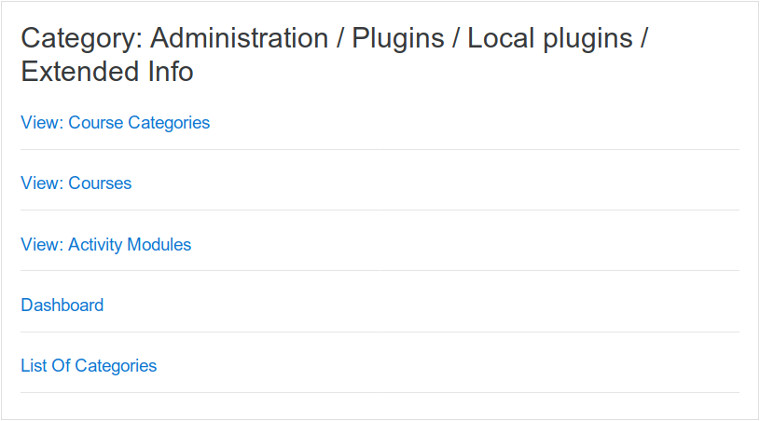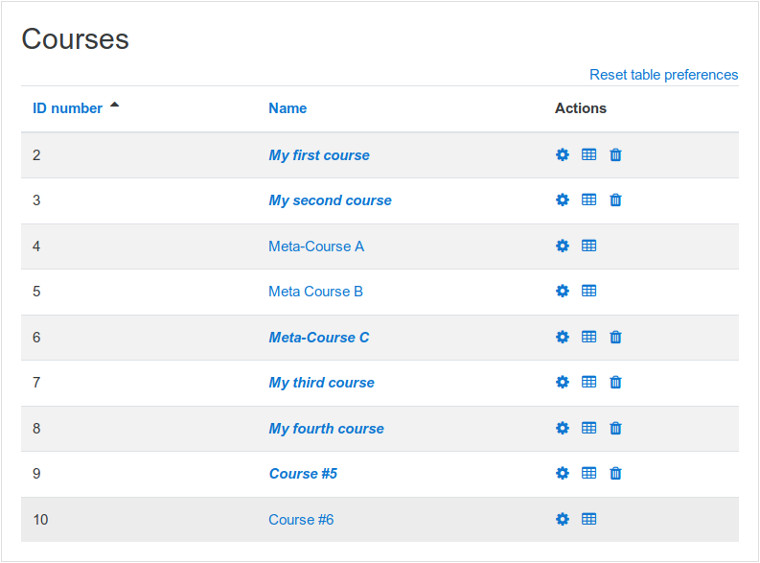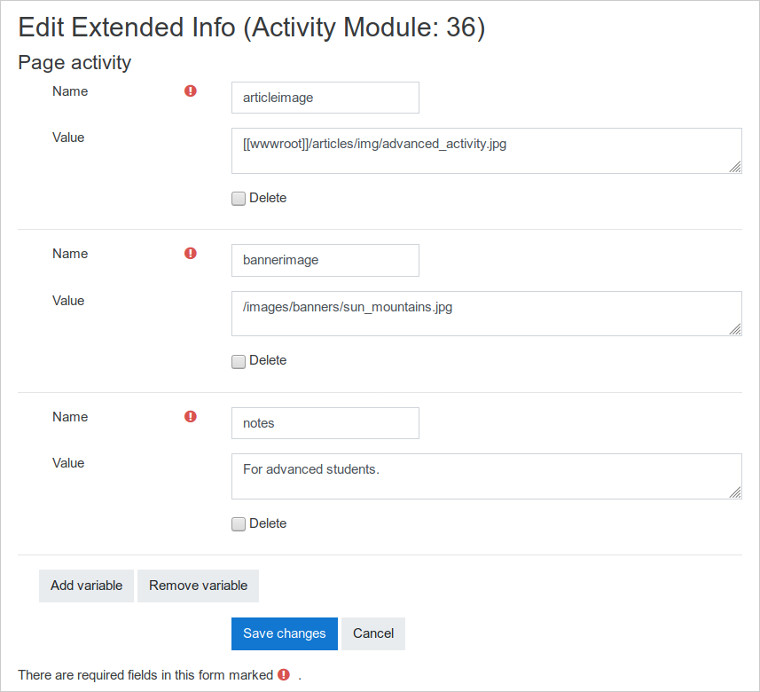https://github.com/nyanginator/moodle-local_extendedinfo
Custom fields for Moodle categories, courses, and modules.
This is a Moodle local plugin that allows you to add extra information about categories, courses, and modules by associating them with custom text fields that you define. The Moodle Cache is utilized for more efficiency.
Create the folder local/extendedinfo in your Moodle installation and copy the contents of this repository there. Login as the Moodle admin and proceed through the normal installation of this new plugin. If the plugin is not automatically found, you may have to go to Site Administration > Notifications.
You can access all Extended Info data by going to Site Administration > Plugins > Local Plugins > Extended Info. There are 5 links:
- View: Course Categories
- View a table of available categories
- View: Courses
- View a table of available courses
- View: Activity Modules
- View a table of available activity modules
- Dashboard
- Edit Extended Info for the main home page (i.e.
/my).
- Edit Extended Info for the main home page (i.e.
- List Of Categories
- Edit Extended Info for the categories index page (i.e.
/course/index.php).
- Edit Extended Info for the categories index page (i.e.
In the table view, you will see names show up in bold and italic wherever Extended Info exists. For each row:
- Click the gear icon to edit the Extended Info fields of an instance.
- In the Categories view, click the table icon to view courses of that category.
- In the Courses view, click the table icon to view activity modules of that course.
- Click the trash icon to delete all Extended Info fields of an instance.
- Click a column header to sort the table by that column.
- Click a name to go to the category/course/module page.
For convenience, you can add an Extended Info Button to your theme layout/template code so that you can jump directly to the Extended Info of any category, course, or module. Remember that you need to be logged in with administrator privileges to see the button.
Use this code to generate the button:
require_once($CFG->dirroot . '/local/extendedinfo/lib.php');
$extendedinfo_btn = local_extendedinfo_settings_button();
echo $extendedinfo_btn; // Or include in your mustache template's contextYou can add this button, for example, above your main content:
You can access the form for adding/editing Extended Info either through the Site Administration interface, or the Extended Info Button shortcut. When adding or editing Extended Info fields, you can add/remove as many fields as you like. All fields are defined by a name and a value. To delete a field, tick its Delete checkbox and click Save Changes.
There is a function called subvars() in lib.php. The purpose of this function is to automatically substitute predefined variables with a hardcoded value. By default, only wwwroot is defined.
$subnames = [ 'wwwroot' ];
...
// Add more if-else cases here to define more variables
if ($var == 'wwwroot') {
$subbed_var = $CFG->wwwroot;
}Enclose the variable in double square brackets when you use it in an extended field's value (e.g. [[wwwroot]]/articles/img/advanced_activity.jpg).
To retrieve Extended Info using PHP, use the local_extendedinfo_get() function with category, course, or module as the first parameter and the ID as the second, which will return an associative array of Extended Info values indexed by names. For example, on a course page:
require_once($CFG->dirroot . '/local/extendedinfo/lib.php');
global $PAGE;
$extinfo = local_extendedinfo_get('course', $PAGE->course->id);
if (isset($extinfo['bannerimage'])) {
echo '<img src="' . $extinfo['bannerimage'] . '">';
}There is an optional third parameter for formatting the value fields (i.e. FORMAT_MOODLE, FORMAT_HTML, FORMAT_PLAIN, FORMAT_WIKI, FORMAT_MARKDOWN). The default is FORMAT_HTML. A value of -1 will return the raw unprocessed values.
Make sure you periodically run the Moodle cron command. This will clear out any Extended Info fields of deleted categories, courses, and modules. Note that Extended Info will only be deleted after the associated categories, courses, or modules are actually deleted from the database, which may require their own separate cron run first.
Uninstall by going to Site Administration > Plugins > Plugins Overview and using the Uninstall link for the local/extendedinfo plugin.
Nicholas Yang
https://nyanginator.com



